Unilever: Analysis of Employment Relations, Stakeholders, and Laws
VerifiedAdded on 2022/12/27
|13
|3283
|38
Report
AI Summary
This report provides a detailed analysis of the work and employment relationship, focusing on Unilever. It begins by explaining the value and importance of employee relations, alongside the fundamentals of employment law, including the Equality Act 2010, Employment Rights Act 1996, and the National Minimum Wage Act 1998. The report then explores the rights, duties, and obligations of both employers and employees, and discusses mechanisms for managing employment relationships such as open communication and psychological contracts. A key component of the report involves a stakeholder analysis, using a matrix to categorize stakeholders based on power and interest, and examining how stakeholder engagement supports positive employee relations. Finally, the report assesses the impact of both positive and negative employee relations on various stakeholders, concluding with a synthesis of the findings. The report uses Unilever as a case study throughout, providing real-world context and examples.
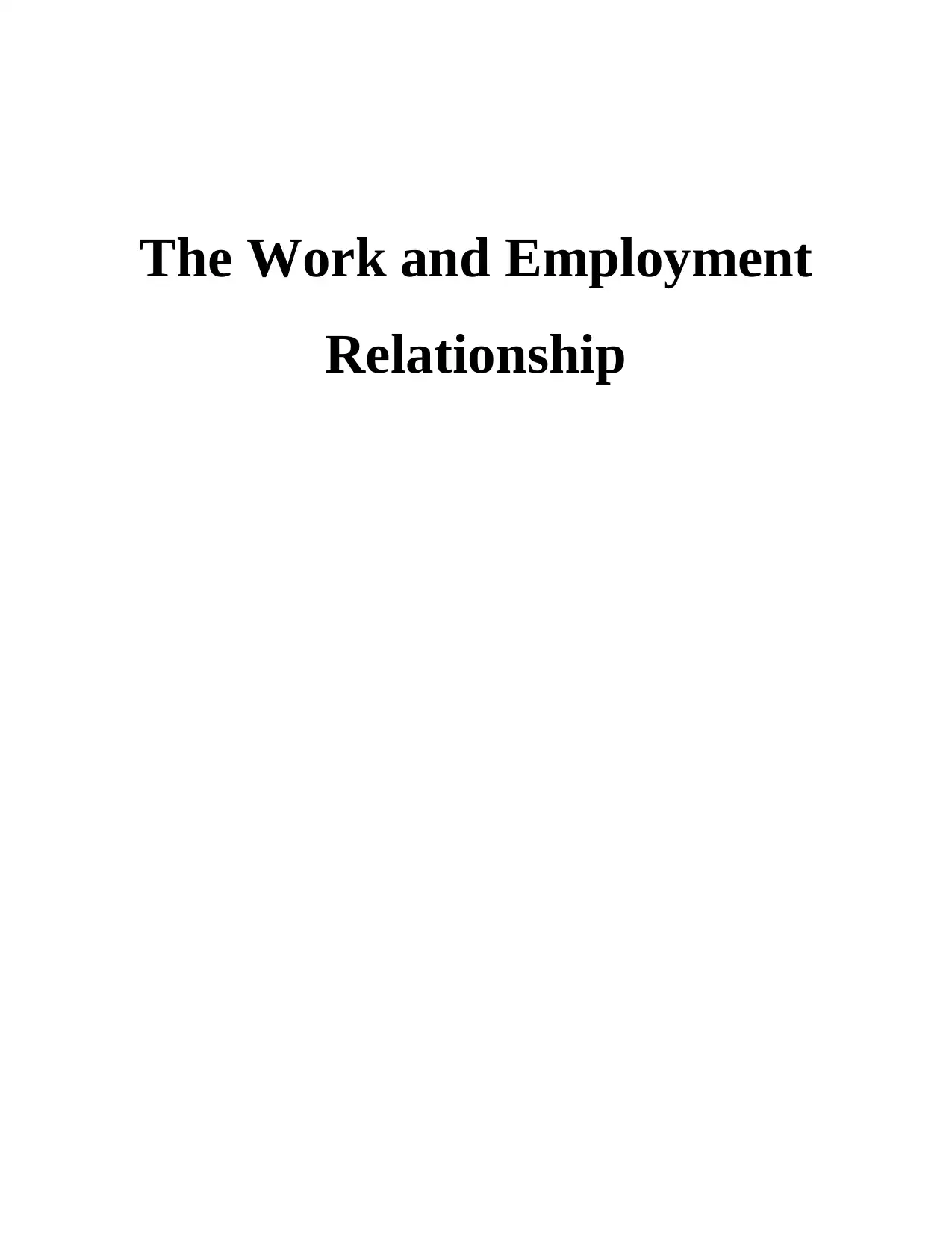
The Work and Employment
Relationship
Relationship
Paraphrase This Document
Need a fresh take? Get an instant paraphrase of this document with our AI Paraphraser
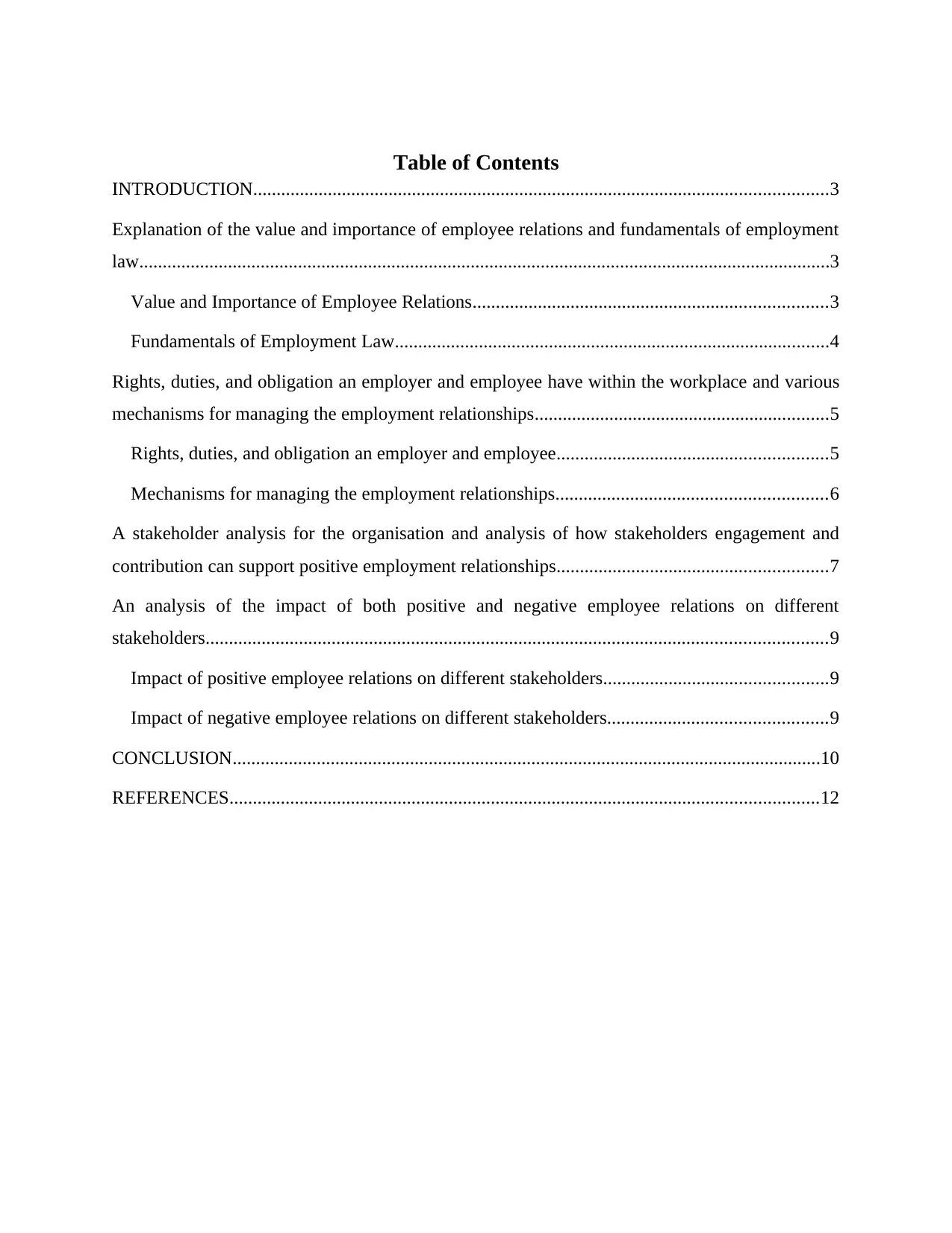
Table of Contents
INTRODUCTION...........................................................................................................................3
Explanation of the value and importance of employee relations and fundamentals of employment
law....................................................................................................................................................3
Value and Importance of Employee Relations............................................................................3
Fundamentals of Employment Law.............................................................................................4
Rights, duties, and obligation an employer and employee have within the workplace and various
mechanisms for managing the employment relationships...............................................................5
Rights, duties, and obligation an employer and employee..........................................................5
Mechanisms for managing the employment relationships..........................................................6
A stakeholder analysis for the organisation and analysis of how stakeholders engagement and
contribution can support positive employment relationships..........................................................7
An analysis of the impact of both positive and negative employee relations on different
stakeholders.....................................................................................................................................9
Impact of positive employee relations on different stakeholders................................................9
Impact of negative employee relations on different stakeholders...............................................9
CONCLUSION..............................................................................................................................10
REFERENCES..............................................................................................................................12
INTRODUCTION...........................................................................................................................3
Explanation of the value and importance of employee relations and fundamentals of employment
law....................................................................................................................................................3
Value and Importance of Employee Relations............................................................................3
Fundamentals of Employment Law.............................................................................................4
Rights, duties, and obligation an employer and employee have within the workplace and various
mechanisms for managing the employment relationships...............................................................5
Rights, duties, and obligation an employer and employee..........................................................5
Mechanisms for managing the employment relationships..........................................................6
A stakeholder analysis for the organisation and analysis of how stakeholders engagement and
contribution can support positive employment relationships..........................................................7
An analysis of the impact of both positive and negative employee relations on different
stakeholders.....................................................................................................................................9
Impact of positive employee relations on different stakeholders................................................9
Impact of negative employee relations on different stakeholders...............................................9
CONCLUSION..............................................................................................................................10
REFERENCES..............................................................................................................................12
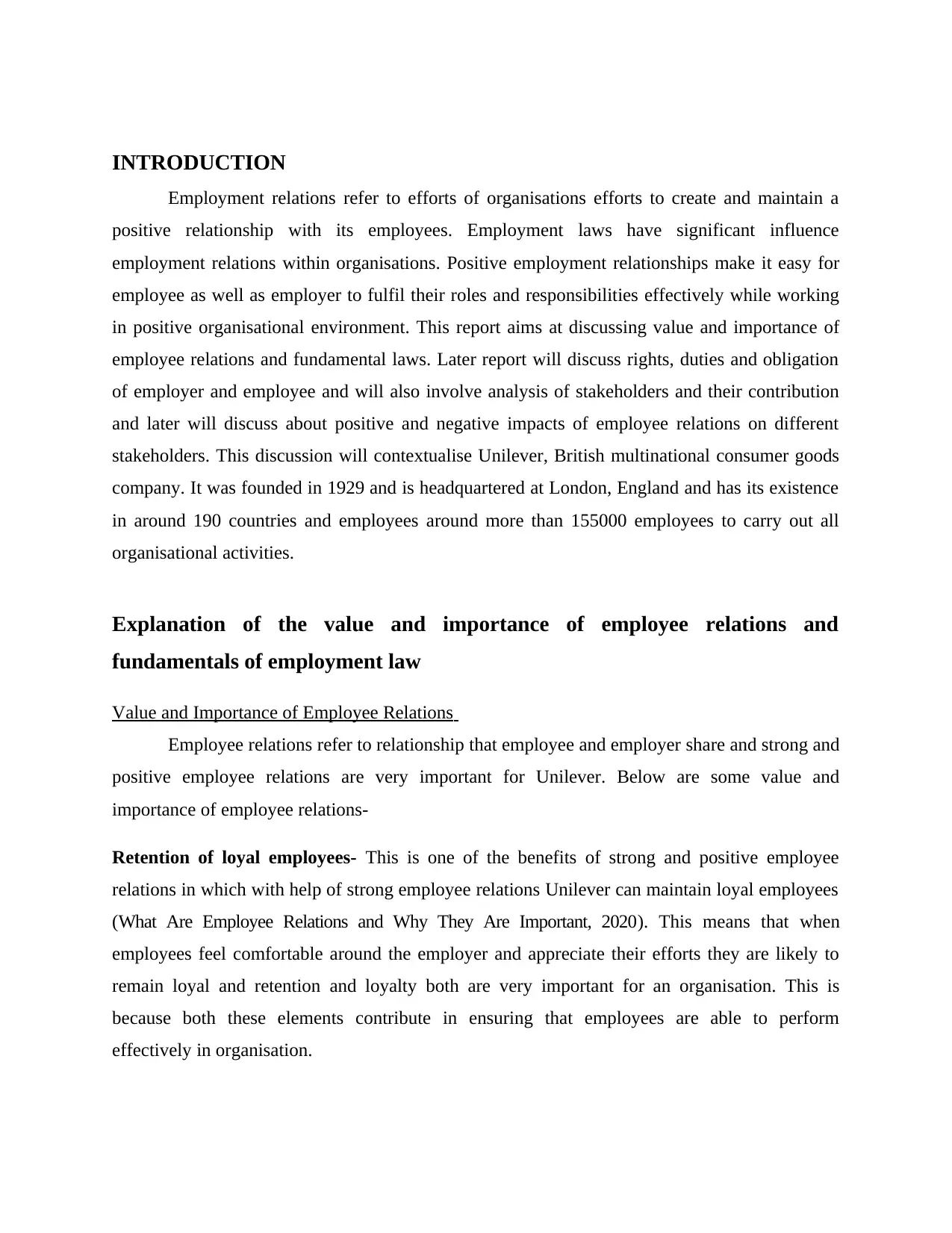
INTRODUCTION
Employment relations refer to efforts of organisations efforts to create and maintain a
positive relationship with its employees. Employment laws have significant influence
employment relations within organisations. Positive employment relationships make it easy for
employee as well as employer to fulfil their roles and responsibilities effectively while working
in positive organisational environment. This report aims at discussing value and importance of
employee relations and fundamental laws. Later report will discuss rights, duties and obligation
of employer and employee and will also involve analysis of stakeholders and their contribution
and later will discuss about positive and negative impacts of employee relations on different
stakeholders. This discussion will contextualise Unilever, British multinational consumer goods
company. It was founded in 1929 and is headquartered at London, England and has its existence
in around 190 countries and employees around more than 155000 employees to carry out all
organisational activities.
Explanation of the value and importance of employee relations and
fundamentals of employment law
Value and Importance of Employee Relations
Employee relations refer to relationship that employee and employer share and strong and
positive employee relations are very important for Unilever. Below are some value and
importance of employee relations-
Retention of loyal employees- This is one of the benefits of strong and positive employee
relations in which with help of strong employee relations Unilever can maintain loyal employees
(What Are Employee Relations and Why They Are Important, 2020). This means that when
employees feel comfortable around the employer and appreciate their efforts they are likely to
remain loyal and retention and loyalty both are very important for an organisation. This is
because both these elements contribute in ensuring that employees are able to perform
effectively in organisation.
Employment relations refer to efforts of organisations efforts to create and maintain a
positive relationship with its employees. Employment laws have significant influence
employment relations within organisations. Positive employment relationships make it easy for
employee as well as employer to fulfil their roles and responsibilities effectively while working
in positive organisational environment. This report aims at discussing value and importance of
employee relations and fundamental laws. Later report will discuss rights, duties and obligation
of employer and employee and will also involve analysis of stakeholders and their contribution
and later will discuss about positive and negative impacts of employee relations on different
stakeholders. This discussion will contextualise Unilever, British multinational consumer goods
company. It was founded in 1929 and is headquartered at London, England and has its existence
in around 190 countries and employees around more than 155000 employees to carry out all
organisational activities.
Explanation of the value and importance of employee relations and
fundamentals of employment law
Value and Importance of Employee Relations
Employee relations refer to relationship that employee and employer share and strong and
positive employee relations are very important for Unilever. Below are some value and
importance of employee relations-
Retention of loyal employees- This is one of the benefits of strong and positive employee
relations in which with help of strong employee relations Unilever can maintain loyal employees
(What Are Employee Relations and Why They Are Important, 2020). This means that when
employees feel comfortable around the employer and appreciate their efforts they are likely to
remain loyal and retention and loyalty both are very important for an organisation. This is
because both these elements contribute in ensuring that employees are able to perform
effectively in organisation.
⊘ This is a preview!⊘
Do you want full access?
Subscribe today to unlock all pages.

Trusted by 1+ million students worldwide
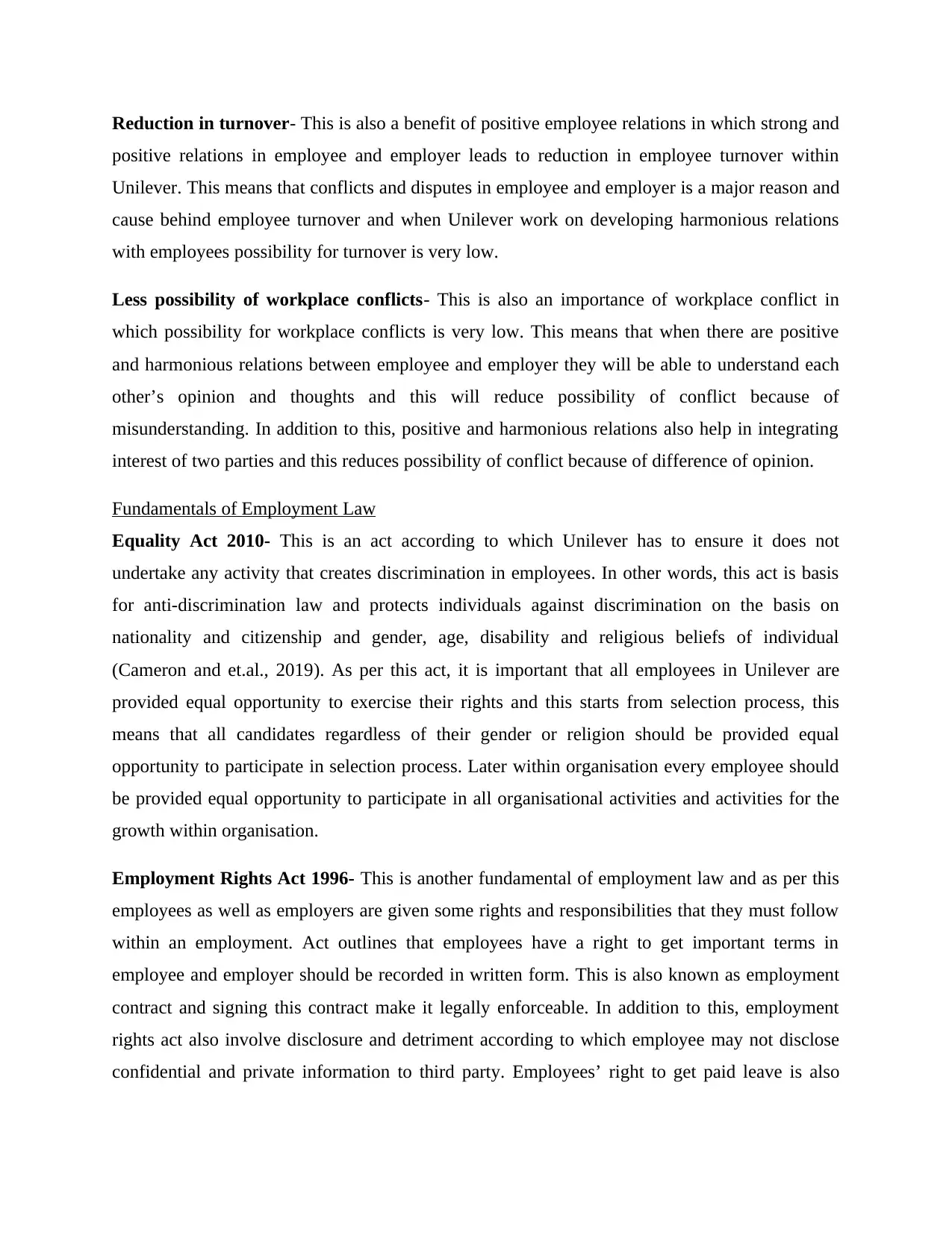
Reduction in turnover- This is also a benefit of positive employee relations in which strong and
positive relations in employee and employer leads to reduction in employee turnover within
Unilever. This means that conflicts and disputes in employee and employer is a major reason and
cause behind employee turnover and when Unilever work on developing harmonious relations
with employees possibility for turnover is very low.
Less possibility of workplace conflicts- This is also an importance of workplace conflict in
which possibility for workplace conflicts is very low. This means that when there are positive
and harmonious relations between employee and employer they will be able to understand each
other’s opinion and thoughts and this will reduce possibility of conflict because of
misunderstanding. In addition to this, positive and harmonious relations also help in integrating
interest of two parties and this reduces possibility of conflict because of difference of opinion.
Fundamentals of Employment Law
Equality Act 2010- This is an act according to which Unilever has to ensure it does not
undertake any activity that creates discrimination in employees. In other words, this act is basis
for anti-discrimination law and protects individuals against discrimination on the basis on
nationality and citizenship and gender, age, disability and religious beliefs of individual
(Cameron and et.al., 2019). As per this act, it is important that all employees in Unilever are
provided equal opportunity to exercise their rights and this starts from selection process, this
means that all candidates regardless of their gender or religion should be provided equal
opportunity to participate in selection process. Later within organisation every employee should
be provided equal opportunity to participate in all organisational activities and activities for the
growth within organisation.
Employment Rights Act 1996- This is another fundamental of employment law and as per this
employees as well as employers are given some rights and responsibilities that they must follow
within an employment. Act outlines that employees have a right to get important terms in
employee and employer should be recorded in written form. This is also known as employment
contract and signing this contract make it legally enforceable. In addition to this, employment
rights act also involve disclosure and detriment according to which employee may not disclose
confidential and private information to third party. Employees’ right to get paid leave is also
positive relations in employee and employer leads to reduction in employee turnover within
Unilever. This means that conflicts and disputes in employee and employer is a major reason and
cause behind employee turnover and when Unilever work on developing harmonious relations
with employees possibility for turnover is very low.
Less possibility of workplace conflicts- This is also an importance of workplace conflict in
which possibility for workplace conflicts is very low. This means that when there are positive
and harmonious relations between employee and employer they will be able to understand each
other’s opinion and thoughts and this will reduce possibility of conflict because of
misunderstanding. In addition to this, positive and harmonious relations also help in integrating
interest of two parties and this reduces possibility of conflict because of difference of opinion.
Fundamentals of Employment Law
Equality Act 2010- This is an act according to which Unilever has to ensure it does not
undertake any activity that creates discrimination in employees. In other words, this act is basis
for anti-discrimination law and protects individuals against discrimination on the basis on
nationality and citizenship and gender, age, disability and religious beliefs of individual
(Cameron and et.al., 2019). As per this act, it is important that all employees in Unilever are
provided equal opportunity to exercise their rights and this starts from selection process, this
means that all candidates regardless of their gender or religion should be provided equal
opportunity to participate in selection process. Later within organisation every employee should
be provided equal opportunity to participate in all organisational activities and activities for the
growth within organisation.
Employment Rights Act 1996- This is another fundamental of employment law and as per this
employees as well as employers are given some rights and responsibilities that they must follow
within an employment. Act outlines that employees have a right to get important terms in
employee and employer should be recorded in written form. This is also known as employment
contract and signing this contract make it legally enforceable. In addition to this, employment
rights act also involve disclosure and detriment according to which employee may not disclose
confidential and private information to third party. Employees’ right to get paid leave is also
Paraphrase This Document
Need a fresh take? Get an instant paraphrase of this document with our AI Paraphraser
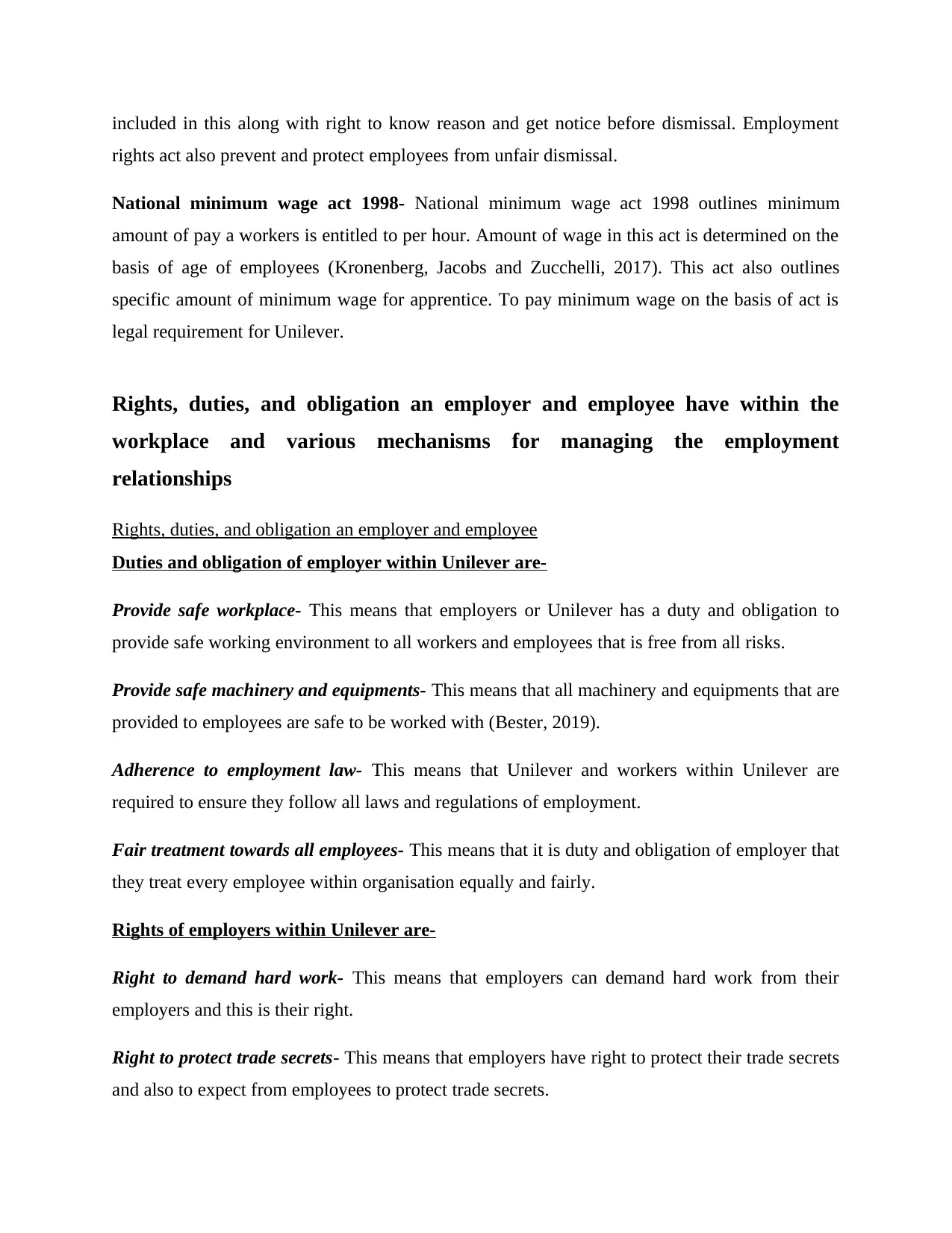
included in this along with right to know reason and get notice before dismissal. Employment
rights act also prevent and protect employees from unfair dismissal.
National minimum wage act 1998- National minimum wage act 1998 outlines minimum
amount of pay a workers is entitled to per hour. Amount of wage in this act is determined on the
basis of age of employees (Kronenberg, Jacobs and Zucchelli, 2017). This act also outlines
specific amount of minimum wage for apprentice. To pay minimum wage on the basis of act is
legal requirement for Unilever.
Rights, duties, and obligation an employer and employee have within the
workplace and various mechanisms for managing the employment
relationships
Rights, duties, and obligation an employer and employee
Duties and obligation of employer within Unilever are-
Provide safe workplace- This means that employers or Unilever has a duty and obligation to
provide safe working environment to all workers and employees that is free from all risks.
Provide safe machinery and equipments- This means that all machinery and equipments that are
provided to employees are safe to be worked with (Bester, 2019).
Adherence to employment law- This means that Unilever and workers within Unilever are
required to ensure they follow all laws and regulations of employment.
Fair treatment towards all employees- This means that it is duty and obligation of employer that
they treat every employee within organisation equally and fairly.
Rights of employers within Unilever are-
Right to demand hard work- This means that employers can demand hard work from their
employers and this is their right.
Right to protect trade secrets- This means that employers have right to protect their trade secrets
and also to expect from employees to protect trade secrets.
rights act also prevent and protect employees from unfair dismissal.
National minimum wage act 1998- National minimum wage act 1998 outlines minimum
amount of pay a workers is entitled to per hour. Amount of wage in this act is determined on the
basis of age of employees (Kronenberg, Jacobs and Zucchelli, 2017). This act also outlines
specific amount of minimum wage for apprentice. To pay minimum wage on the basis of act is
legal requirement for Unilever.
Rights, duties, and obligation an employer and employee have within the
workplace and various mechanisms for managing the employment
relationships
Rights, duties, and obligation an employer and employee
Duties and obligation of employer within Unilever are-
Provide safe workplace- This means that employers or Unilever has a duty and obligation to
provide safe working environment to all workers and employees that is free from all risks.
Provide safe machinery and equipments- This means that all machinery and equipments that are
provided to employees are safe to be worked with (Bester, 2019).
Adherence to employment law- This means that Unilever and workers within Unilever are
required to ensure they follow all laws and regulations of employment.
Fair treatment towards all employees- This means that it is duty and obligation of employer that
they treat every employee within organisation equally and fairly.
Rights of employers within Unilever are-
Right to demand hard work- This means that employers can demand hard work from their
employers and this is their right.
Right to protect trade secrets- This means that employers have right to protect their trade secrets
and also to expect from employees to protect trade secrets.
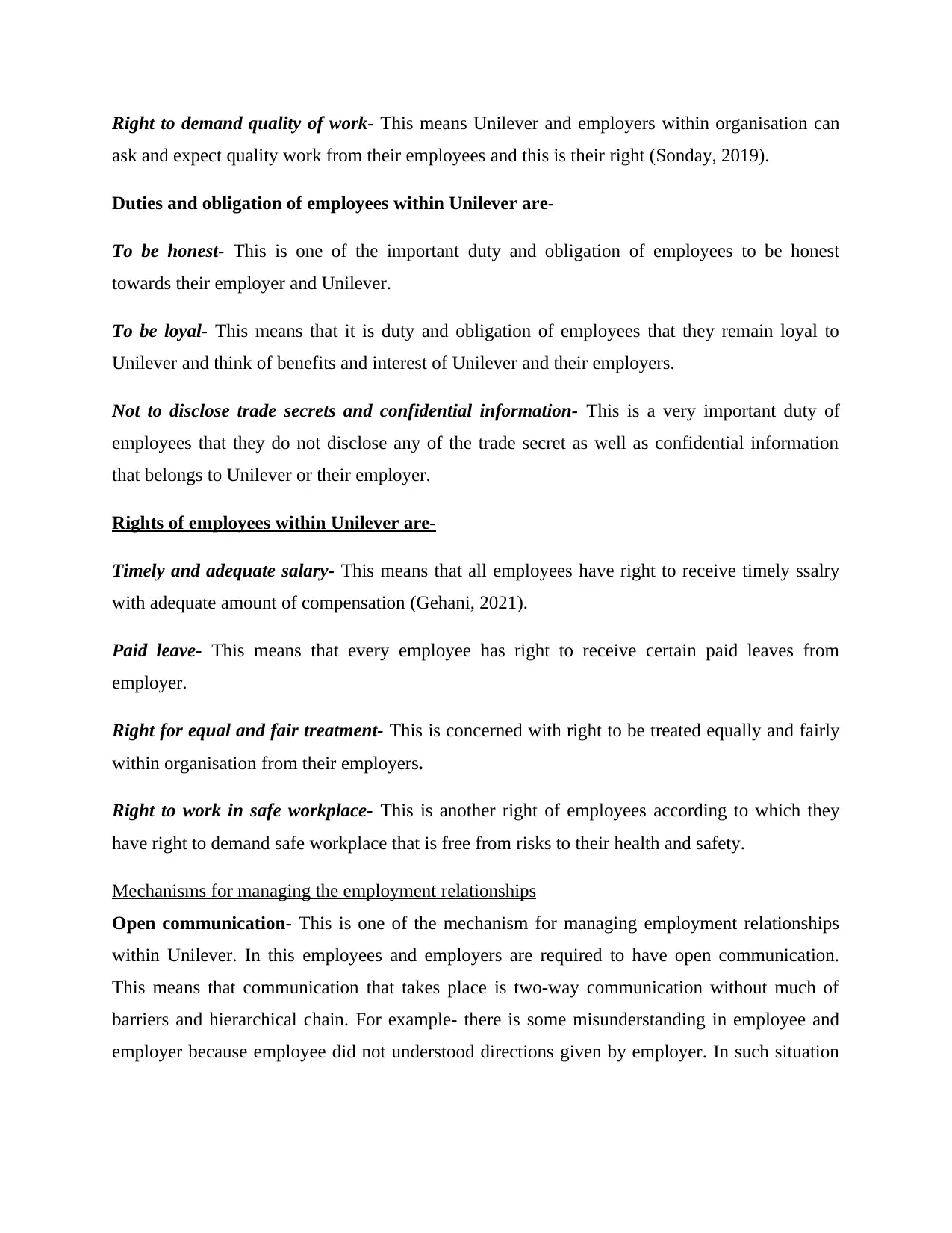
Right to demand quality of work- This means Unilever and employers within organisation can
ask and expect quality work from their employees and this is their right (Sonday, 2019).
Duties and obligation of employees within Unilever are-
To be honest- This is one of the important duty and obligation of employees to be honest
towards their employer and Unilever.
To be loyal- This means that it is duty and obligation of employees that they remain loyal to
Unilever and think of benefits and interest of Unilever and their employers.
Not to disclose trade secrets and confidential information- This is a very important duty of
employees that they do not disclose any of the trade secret as well as confidential information
that belongs to Unilever or their employer.
Rights of employees within Unilever are-
Timely and adequate salary- This means that all employees have right to receive timely ssalry
with adequate amount of compensation (Gehani, 2021).
Paid leave- This means that every employee has right to receive certain paid leaves from
employer.
Right for equal and fair treatment- This is concerned with right to be treated equally and fairly
within organisation from their employers.
Right to work in safe workplace- This is another right of employees according to which they
have right to demand safe workplace that is free from risks to their health and safety.
Mechanisms for managing the employment relationships
Open communication- This is one of the mechanism for managing employment relationships
within Unilever. In this employees and employers are required to have open communication.
This means that communication that takes place is two-way communication without much of
barriers and hierarchical chain. For example- there is some misunderstanding in employee and
employer because employee did not understood directions given by employer. In such situation
ask and expect quality work from their employees and this is their right (Sonday, 2019).
Duties and obligation of employees within Unilever are-
To be honest- This is one of the important duty and obligation of employees to be honest
towards their employer and Unilever.
To be loyal- This means that it is duty and obligation of employees that they remain loyal to
Unilever and think of benefits and interest of Unilever and their employers.
Not to disclose trade secrets and confidential information- This is a very important duty of
employees that they do not disclose any of the trade secret as well as confidential information
that belongs to Unilever or their employer.
Rights of employees within Unilever are-
Timely and adequate salary- This means that all employees have right to receive timely ssalry
with adequate amount of compensation (Gehani, 2021).
Paid leave- This means that every employee has right to receive certain paid leaves from
employer.
Right for equal and fair treatment- This is concerned with right to be treated equally and fairly
within organisation from their employers.
Right to work in safe workplace- This is another right of employees according to which they
have right to demand safe workplace that is free from risks to their health and safety.
Mechanisms for managing the employment relationships
Open communication- This is one of the mechanism for managing employment relationships
within Unilever. In this employees and employers are required to have open communication.
This means that communication that takes place is two-way communication without much of
barriers and hierarchical chain. For example- there is some misunderstanding in employee and
employer because employee did not understood directions given by employer. In such situation
⊘ This is a preview!⊘
Do you want full access?
Subscribe today to unlock all pages.

Trusted by 1+ million students worldwide
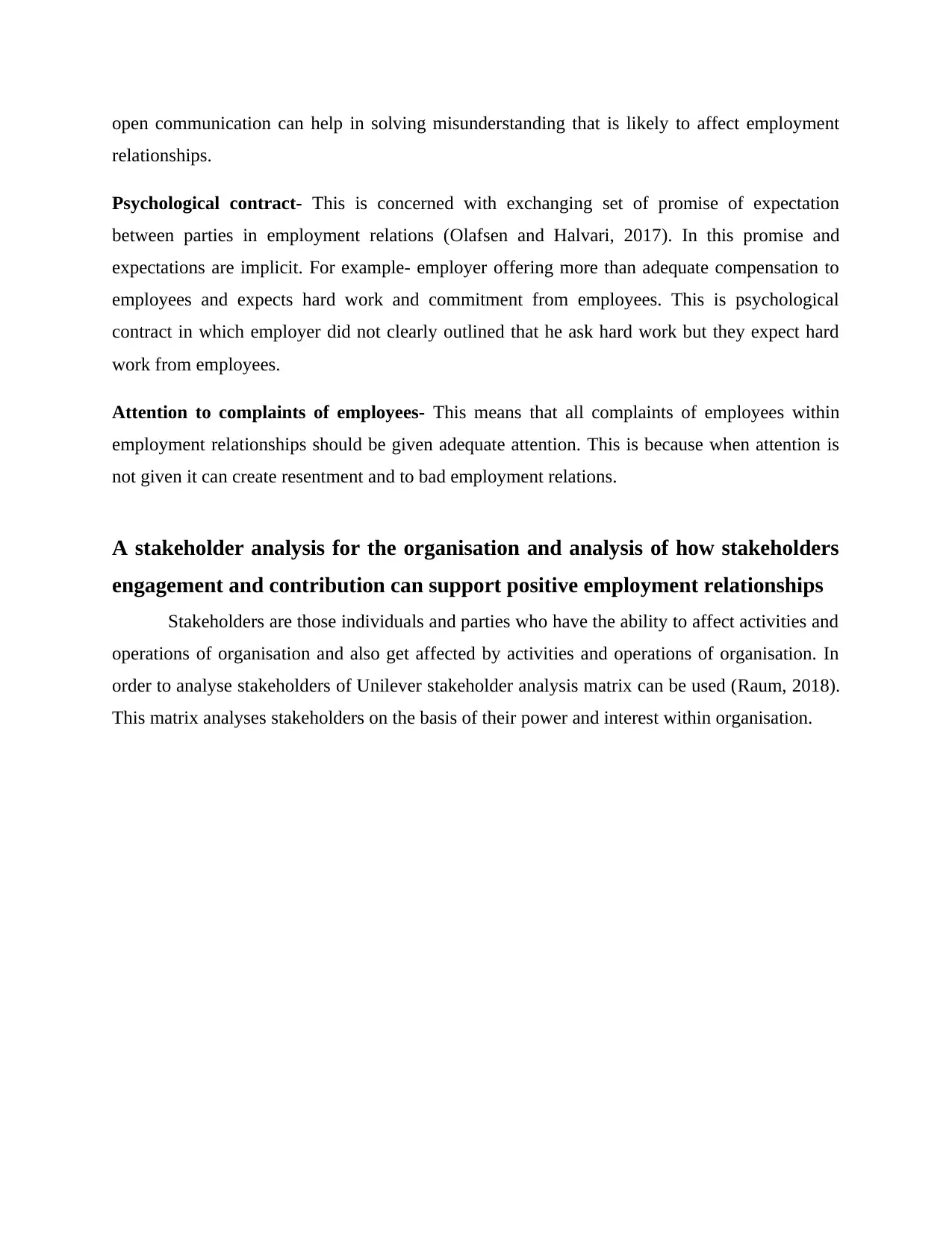
open communication can help in solving misunderstanding that is likely to affect employment
relationships.
Psychological contract- This is concerned with exchanging set of promise of expectation
between parties in employment relations (Olafsen and Halvari, 2017). In this promise and
expectations are implicit. For example- employer offering more than adequate compensation to
employees and expects hard work and commitment from employees. This is psychological
contract in which employer did not clearly outlined that he ask hard work but they expect hard
work from employees.
Attention to complaints of employees- This means that all complaints of employees within
employment relationships should be given adequate attention. This is because when attention is
not given it can create resentment and to bad employment relations.
A stakeholder analysis for the organisation and analysis of how stakeholders
engagement and contribution can support positive employment relationships
Stakeholders are those individuals and parties who have the ability to affect activities and
operations of organisation and also get affected by activities and operations of organisation. In
order to analyse stakeholders of Unilever stakeholder analysis matrix can be used (Raum, 2018).
This matrix analyses stakeholders on the basis of their power and interest within organisation.
relationships.
Psychological contract- This is concerned with exchanging set of promise of expectation
between parties in employment relations (Olafsen and Halvari, 2017). In this promise and
expectations are implicit. For example- employer offering more than adequate compensation to
employees and expects hard work and commitment from employees. This is psychological
contract in which employer did not clearly outlined that he ask hard work but they expect hard
work from employees.
Attention to complaints of employees- This means that all complaints of employees within
employment relationships should be given adequate attention. This is because when attention is
not given it can create resentment and to bad employment relations.
A stakeholder analysis for the organisation and analysis of how stakeholders
engagement and contribution can support positive employment relationships
Stakeholders are those individuals and parties who have the ability to affect activities and
operations of organisation and also get affected by activities and operations of organisation. In
order to analyse stakeholders of Unilever stakeholder analysis matrix can be used (Raum, 2018).
This matrix analyses stakeholders on the basis of their power and interest within organisation.
Paraphrase This Document
Need a fresh take? Get an instant paraphrase of this document with our AI Paraphraser
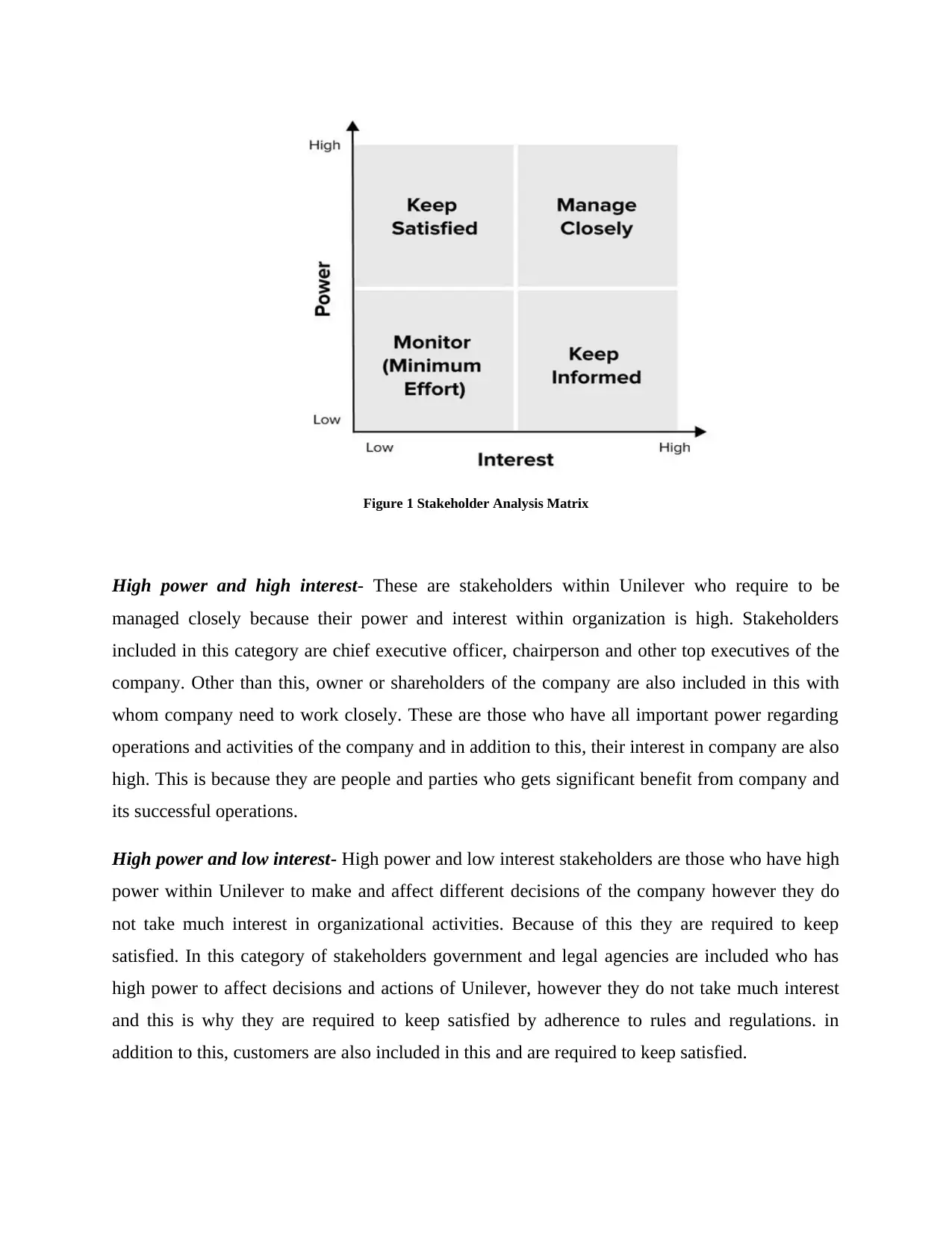
Figure 1 Stakeholder Analysis Matrix
High power and high interest- These are stakeholders within Unilever who require to be
managed closely because their power and interest within organization is high. Stakeholders
included in this category are chief executive officer, chairperson and other top executives of the
company. Other than this, owner or shareholders of the company are also included in this with
whom company need to work closely. These are those who have all important power regarding
operations and activities of the company and in addition to this, their interest in company are also
high. This is because they are people and parties who gets significant benefit from company and
its successful operations.
High power and low interest- High power and low interest stakeholders are those who have high
power within Unilever to make and affect different decisions of the company however they do
not take much interest in organizational activities. Because of this they are required to keep
satisfied. In this category of stakeholders government and legal agencies are included who has
high power to affect decisions and actions of Unilever, however they do not take much interest
and this is why they are required to keep satisfied by adherence to rules and regulations. in
addition to this, customers are also included in this and are required to keep satisfied.
High power and high interest- These are stakeholders within Unilever who require to be
managed closely because their power and interest within organization is high. Stakeholders
included in this category are chief executive officer, chairperson and other top executives of the
company. Other than this, owner or shareholders of the company are also included in this with
whom company need to work closely. These are those who have all important power regarding
operations and activities of the company and in addition to this, their interest in company are also
high. This is because they are people and parties who gets significant benefit from company and
its successful operations.
High power and low interest- High power and low interest stakeholders are those who have high
power within Unilever to make and affect different decisions of the company however they do
not take much interest in organizational activities. Because of this they are required to keep
satisfied. In this category of stakeholders government and legal agencies are included who has
high power to affect decisions and actions of Unilever, however they do not take much interest
and this is why they are required to keep satisfied by adherence to rules and regulations. in
addition to this, customers are also included in this and are required to keep satisfied.
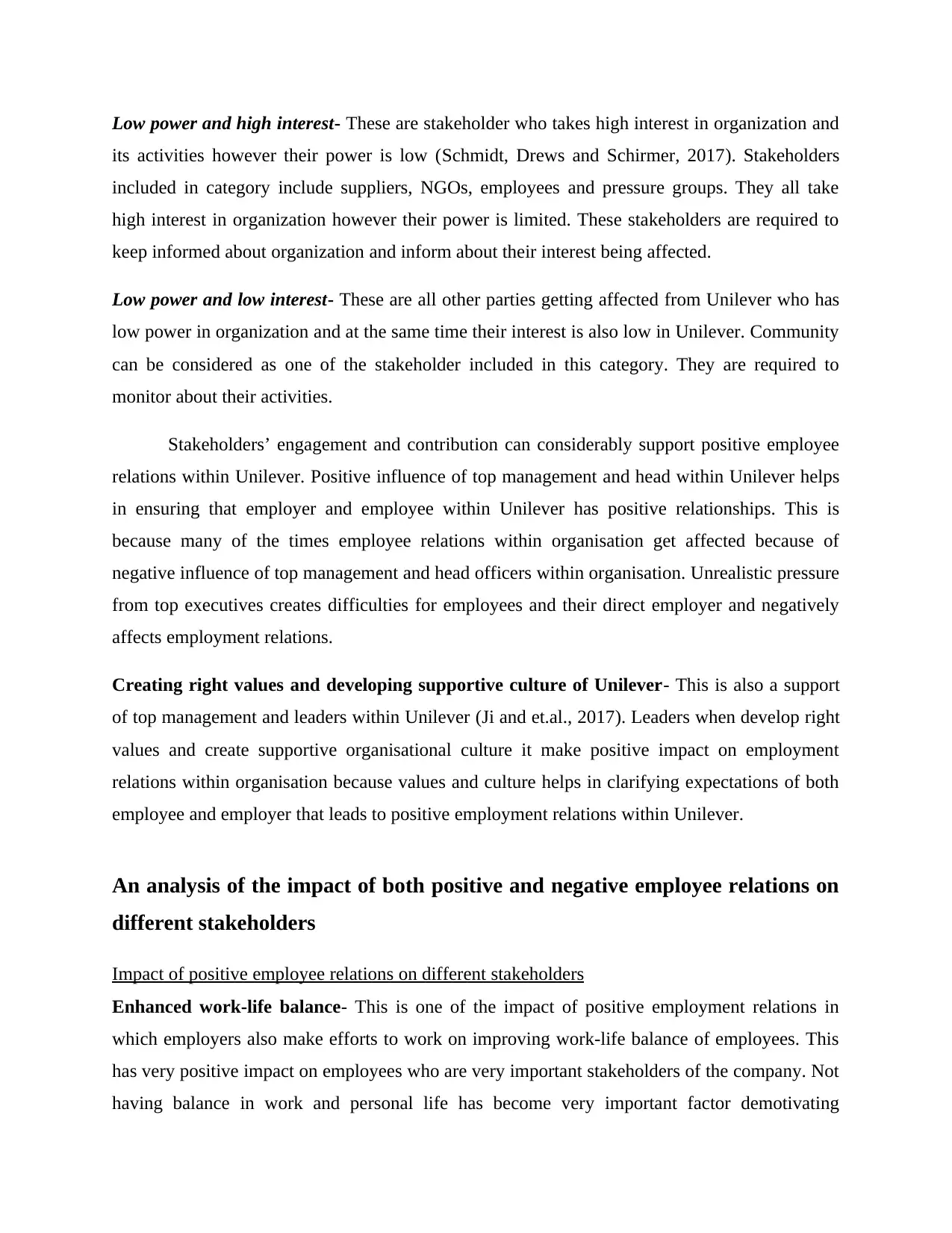
Low power and high interest- These are stakeholder who takes high interest in organization and
its activities however their power is low (Schmidt, Drews and Schirmer, 2017). Stakeholders
included in category include suppliers, NGOs, employees and pressure groups. They all take
high interest in organization however their power is limited. These stakeholders are required to
keep informed about organization and inform about their interest being affected.
Low power and low interest- These are all other parties getting affected from Unilever who has
low power in organization and at the same time their interest is also low in Unilever. Community
can be considered as one of the stakeholder included in this category. They are required to
monitor about their activities.
Stakeholders’ engagement and contribution can considerably support positive employee
relations within Unilever. Positive influence of top management and head within Unilever helps
in ensuring that employer and employee within Unilever has positive relationships. This is
because many of the times employee relations within organisation get affected because of
negative influence of top management and head officers within organisation. Unrealistic pressure
from top executives creates difficulties for employees and their direct employer and negatively
affects employment relations.
Creating right values and developing supportive culture of Unilever- This is also a support
of top management and leaders within Unilever (Ji and et.al., 2017). Leaders when develop right
values and create supportive organisational culture it make positive impact on employment
relations within organisation because values and culture helps in clarifying expectations of both
employee and employer that leads to positive employment relations within Unilever.
An analysis of the impact of both positive and negative employee relations on
different stakeholders
Impact of positive employee relations on different stakeholders
Enhanced work-life balance- This is one of the impact of positive employment relations in
which employers also make efforts to work on improving work-life balance of employees. This
has very positive impact on employees who are very important stakeholders of the company. Not
having balance in work and personal life has become very important factor demotivating
its activities however their power is low (Schmidt, Drews and Schirmer, 2017). Stakeholders
included in category include suppliers, NGOs, employees and pressure groups. They all take
high interest in organization however their power is limited. These stakeholders are required to
keep informed about organization and inform about their interest being affected.
Low power and low interest- These are all other parties getting affected from Unilever who has
low power in organization and at the same time their interest is also low in Unilever. Community
can be considered as one of the stakeholder included in this category. They are required to
monitor about their activities.
Stakeholders’ engagement and contribution can considerably support positive employee
relations within Unilever. Positive influence of top management and head within Unilever helps
in ensuring that employer and employee within Unilever has positive relationships. This is
because many of the times employee relations within organisation get affected because of
negative influence of top management and head officers within organisation. Unrealistic pressure
from top executives creates difficulties for employees and their direct employer and negatively
affects employment relations.
Creating right values and developing supportive culture of Unilever- This is also a support
of top management and leaders within Unilever (Ji and et.al., 2017). Leaders when develop right
values and create supportive organisational culture it make positive impact on employment
relations within organisation because values and culture helps in clarifying expectations of both
employee and employer that leads to positive employment relations within Unilever.
An analysis of the impact of both positive and negative employee relations on
different stakeholders
Impact of positive employee relations on different stakeholders
Enhanced work-life balance- This is one of the impact of positive employment relations in
which employers also make efforts to work on improving work-life balance of employees. This
has very positive impact on employees who are very important stakeholders of the company. Not
having balance in work and personal life has become very important factor demotivating
⊘ This is a preview!⊘
Do you want full access?
Subscribe today to unlock all pages.

Trusted by 1+ million students worldwide
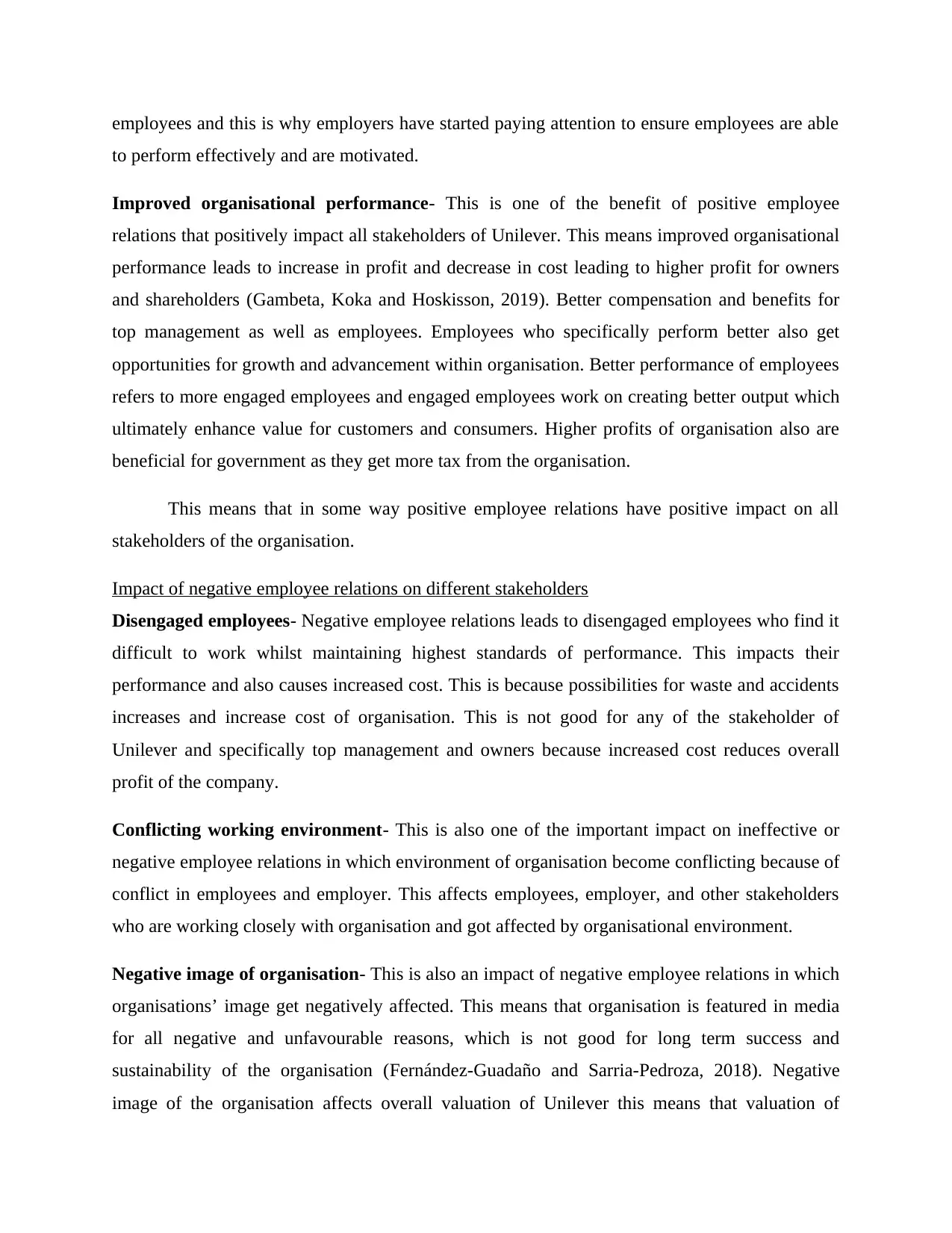
employees and this is why employers have started paying attention to ensure employees are able
to perform effectively and are motivated.
Improved organisational performance- This is one of the benefit of positive employee
relations that positively impact all stakeholders of Unilever. This means improved organisational
performance leads to increase in profit and decrease in cost leading to higher profit for owners
and shareholders (Gambeta, Koka and Hoskisson, 2019). Better compensation and benefits for
top management as well as employees. Employees who specifically perform better also get
opportunities for growth and advancement within organisation. Better performance of employees
refers to more engaged employees and engaged employees work on creating better output which
ultimately enhance value for customers and consumers. Higher profits of organisation also are
beneficial for government as they get more tax from the organisation.
This means that in some way positive employee relations have positive impact on all
stakeholders of the organisation.
Impact of negative employee relations on different stakeholders
Disengaged employees- Negative employee relations leads to disengaged employees who find it
difficult to work whilst maintaining highest standards of performance. This impacts their
performance and also causes increased cost. This is because possibilities for waste and accidents
increases and increase cost of organisation. This is not good for any of the stakeholder of
Unilever and specifically top management and owners because increased cost reduces overall
profit of the company.
Conflicting working environment- This is also one of the important impact on ineffective or
negative employee relations in which environment of organisation become conflicting because of
conflict in employees and employer. This affects employees, employer, and other stakeholders
who are working closely with organisation and got affected by organisational environment.
Negative image of organisation- This is also an impact of negative employee relations in which
organisations’ image get negatively affected. This means that organisation is featured in media
for all negative and unfavourable reasons, which is not good for long term success and
sustainability of the organisation (Fernández-Guadaño and Sarria-Pedroza, 2018). Negative
image of the organisation affects overall valuation of Unilever this means that valuation of
to perform effectively and are motivated.
Improved organisational performance- This is one of the benefit of positive employee
relations that positively impact all stakeholders of Unilever. This means improved organisational
performance leads to increase in profit and decrease in cost leading to higher profit for owners
and shareholders (Gambeta, Koka and Hoskisson, 2019). Better compensation and benefits for
top management as well as employees. Employees who specifically perform better also get
opportunities for growth and advancement within organisation. Better performance of employees
refers to more engaged employees and engaged employees work on creating better output which
ultimately enhance value for customers and consumers. Higher profits of organisation also are
beneficial for government as they get more tax from the organisation.
This means that in some way positive employee relations have positive impact on all
stakeholders of the organisation.
Impact of negative employee relations on different stakeholders
Disengaged employees- Negative employee relations leads to disengaged employees who find it
difficult to work whilst maintaining highest standards of performance. This impacts their
performance and also causes increased cost. This is because possibilities for waste and accidents
increases and increase cost of organisation. This is not good for any of the stakeholder of
Unilever and specifically top management and owners because increased cost reduces overall
profit of the company.
Conflicting working environment- This is also one of the important impact on ineffective or
negative employee relations in which environment of organisation become conflicting because of
conflict in employees and employer. This affects employees, employer, and other stakeholders
who are working closely with organisation and got affected by organisational environment.
Negative image of organisation- This is also an impact of negative employee relations in which
organisations’ image get negatively affected. This means that organisation is featured in media
for all negative and unfavourable reasons, which is not good for long term success and
sustainability of the organisation (Fernández-Guadaño and Sarria-Pedroza, 2018). Negative
image of the organisation affects overall valuation of Unilever this means that valuation of
Paraphrase This Document
Need a fresh take? Get an instant paraphrase of this document with our AI Paraphraser
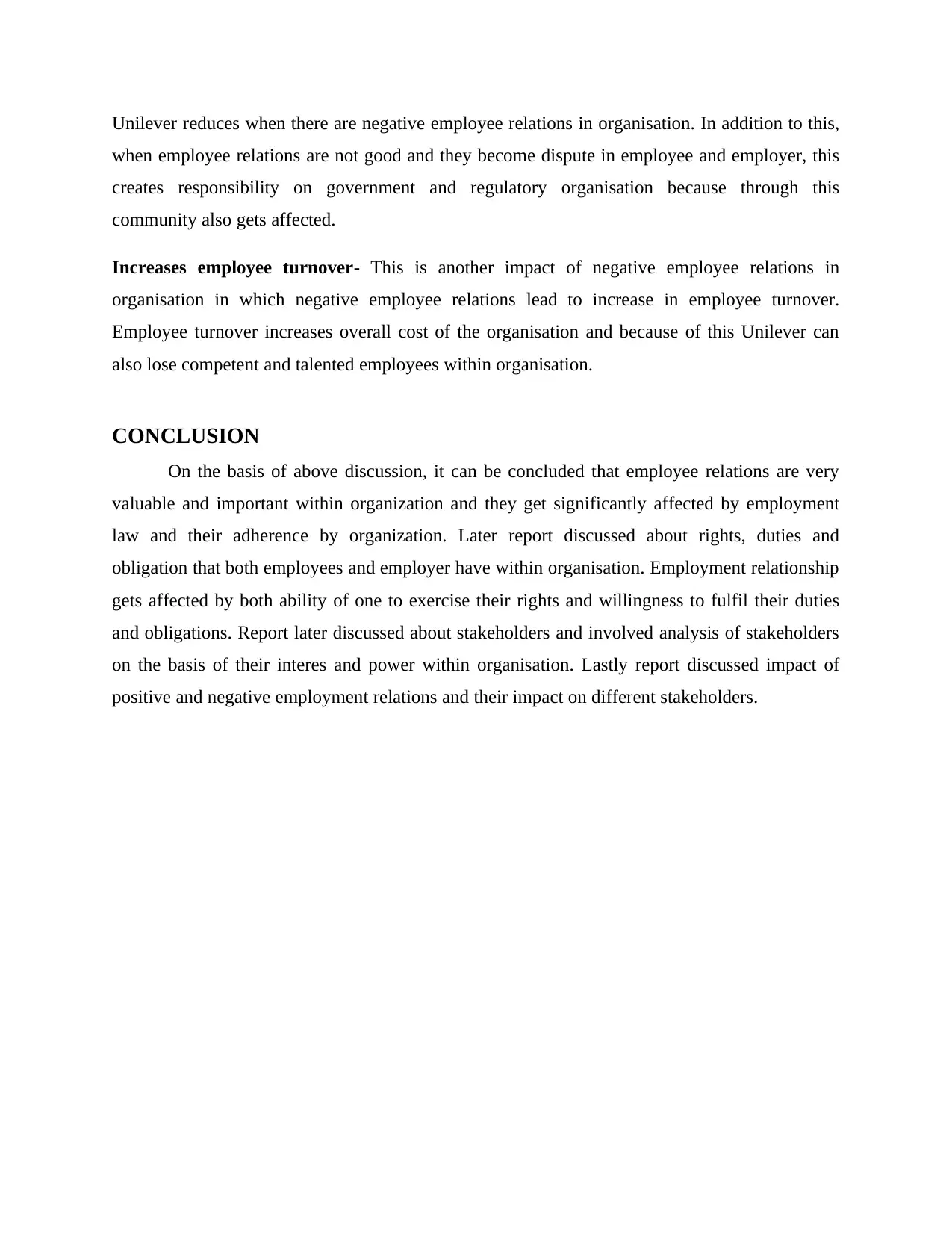
Unilever reduces when there are negative employee relations in organisation. In addition to this,
when employee relations are not good and they become dispute in employee and employer, this
creates responsibility on government and regulatory organisation because through this
community also gets affected.
Increases employee turnover- This is another impact of negative employee relations in
organisation in which negative employee relations lead to increase in employee turnover.
Employee turnover increases overall cost of the organisation and because of this Unilever can
also lose competent and talented employees within organisation.
CONCLUSION
On the basis of above discussion, it can be concluded that employee relations are very
valuable and important within organization and they get significantly affected by employment
law and their adherence by organization. Later report discussed about rights, duties and
obligation that both employees and employer have within organisation. Employment relationship
gets affected by both ability of one to exercise their rights and willingness to fulfil their duties
and obligations. Report later discussed about stakeholders and involved analysis of stakeholders
on the basis of their interes and power within organisation. Lastly report discussed impact of
positive and negative employment relations and their impact on different stakeholders.
when employee relations are not good and they become dispute in employee and employer, this
creates responsibility on government and regulatory organisation because through this
community also gets affected.
Increases employee turnover- This is another impact of negative employee relations in
organisation in which negative employee relations lead to increase in employee turnover.
Employee turnover increases overall cost of the organisation and because of this Unilever can
also lose competent and talented employees within organisation.
CONCLUSION
On the basis of above discussion, it can be concluded that employee relations are very
valuable and important within organization and they get significantly affected by employment
law and their adherence by organization. Later report discussed about rights, duties and
obligation that both employees and employer have within organisation. Employment relationship
gets affected by both ability of one to exercise their rights and willingness to fulfil their duties
and obligations. Report later discussed about stakeholders and involved analysis of stakeholders
on the basis of their interes and power within organisation. Lastly report discussed impact of
positive and negative employment relations and their impact on different stakeholders.
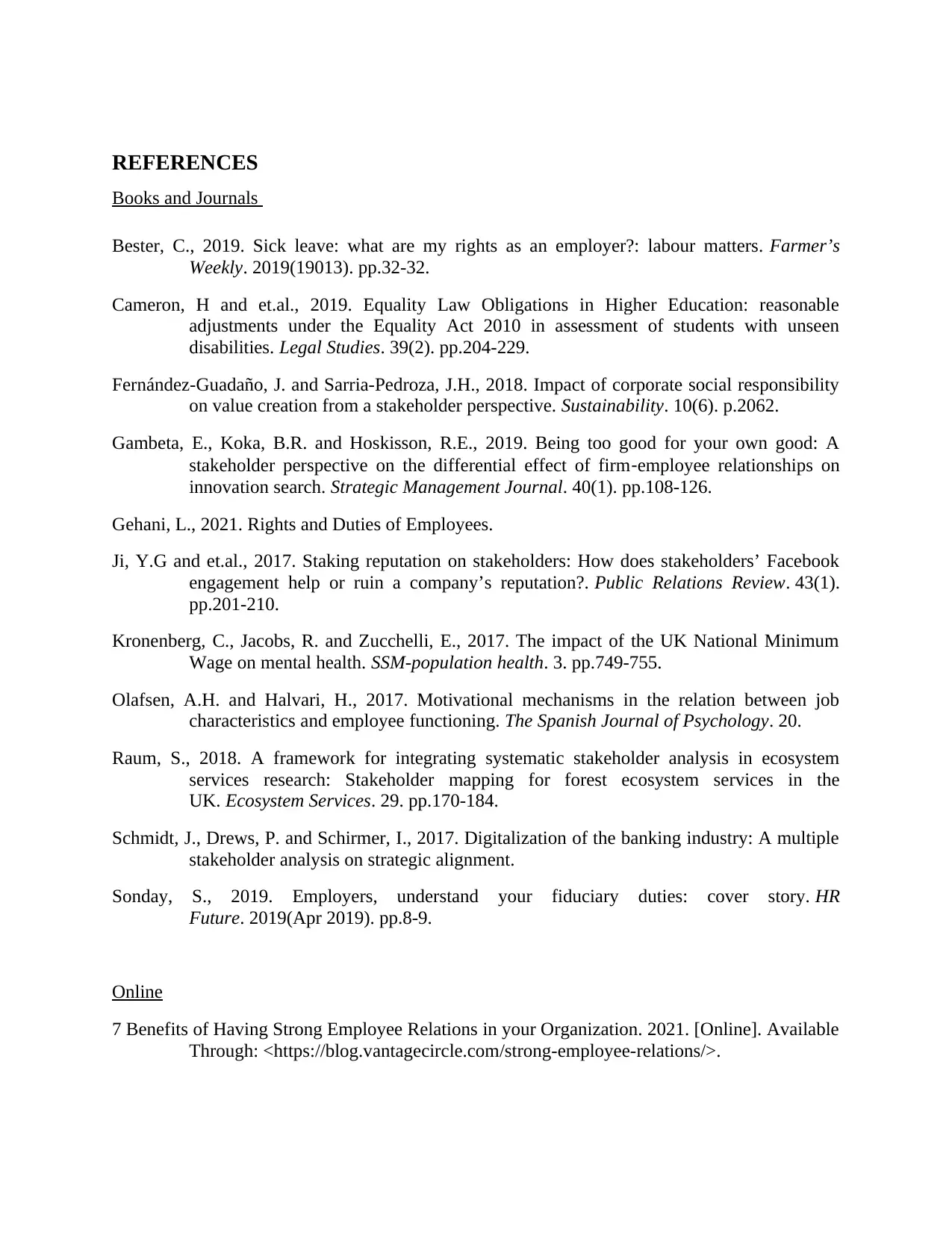
REFERENCES
Books and Journals
Bester, C., 2019. Sick leave: what are my rights as an employer?: labour matters. Farmer’s
Weekly. 2019(19013). pp.32-32.
Cameron, H and et.al., 2019. Equality Law Obligations in Higher Education: reasonable
adjustments under the Equality Act 2010 in assessment of students with unseen
disabilities. Legal Studies. 39(2). pp.204-229.
Fernández-Guadaño, J. and Sarria-Pedroza, J.H., 2018. Impact of corporate social responsibility
on value creation from a stakeholder perspective. Sustainability. 10(6). p.2062.
Gambeta, E., Koka, B.R. and Hoskisson, R.E., 2019. Being too good for your own good: A
stakeholder perspective on the differential effect of firm‐employee relationships on
innovation search. Strategic Management Journal. 40(1). pp.108-126.
Gehani, L., 2021. Rights and Duties of Employees.
Ji, Y.G and et.al., 2017. Staking reputation on stakeholders: How does stakeholders’ Facebook
engagement help or ruin a company’s reputation?. Public Relations Review. 43(1).
pp.201-210.
Kronenberg, C., Jacobs, R. and Zucchelli, E., 2017. The impact of the UK National Minimum
Wage on mental health. SSM-population health. 3. pp.749-755.
Olafsen, A.H. and Halvari, H., 2017. Motivational mechanisms in the relation between job
characteristics and employee functioning. The Spanish Journal of Psychology. 20.
Raum, S., 2018. A framework for integrating systematic stakeholder analysis in ecosystem
services research: Stakeholder mapping for forest ecosystem services in the
UK. Ecosystem Services. 29. pp.170-184.
Schmidt, J., Drews, P. and Schirmer, I., 2017. Digitalization of the banking industry: A multiple
stakeholder analysis on strategic alignment.
Sonday, S., 2019. Employers, understand your fiduciary duties: cover story. HR
Future. 2019(Apr 2019). pp.8-9.
Online
7 Benefits of Having Strong Employee Relations in your Organization. 2021. [Online]. Available
Through: <https://blog.vantagecircle.com/strong-employee-relations/>.
Books and Journals
Bester, C., 2019. Sick leave: what are my rights as an employer?: labour matters. Farmer’s
Weekly. 2019(19013). pp.32-32.
Cameron, H and et.al., 2019. Equality Law Obligations in Higher Education: reasonable
adjustments under the Equality Act 2010 in assessment of students with unseen
disabilities. Legal Studies. 39(2). pp.204-229.
Fernández-Guadaño, J. and Sarria-Pedroza, J.H., 2018. Impact of corporate social responsibility
on value creation from a stakeholder perspective. Sustainability. 10(6). p.2062.
Gambeta, E., Koka, B.R. and Hoskisson, R.E., 2019. Being too good for your own good: A
stakeholder perspective on the differential effect of firm‐employee relationships on
innovation search. Strategic Management Journal. 40(1). pp.108-126.
Gehani, L., 2021. Rights and Duties of Employees.
Ji, Y.G and et.al., 2017. Staking reputation on stakeholders: How does stakeholders’ Facebook
engagement help or ruin a company’s reputation?. Public Relations Review. 43(1).
pp.201-210.
Kronenberg, C., Jacobs, R. and Zucchelli, E., 2017. The impact of the UK National Minimum
Wage on mental health. SSM-population health. 3. pp.749-755.
Olafsen, A.H. and Halvari, H., 2017. Motivational mechanisms in the relation between job
characteristics and employee functioning. The Spanish Journal of Psychology. 20.
Raum, S., 2018. A framework for integrating systematic stakeholder analysis in ecosystem
services research: Stakeholder mapping for forest ecosystem services in the
UK. Ecosystem Services. 29. pp.170-184.
Schmidt, J., Drews, P. and Schirmer, I., 2017. Digitalization of the banking industry: A multiple
stakeholder analysis on strategic alignment.
Sonday, S., 2019. Employers, understand your fiduciary duties: cover story. HR
Future. 2019(Apr 2019). pp.8-9.
Online
7 Benefits of Having Strong Employee Relations in your Organization. 2021. [Online]. Available
Through: <https://blog.vantagecircle.com/strong-employee-relations/>.
⊘ This is a preview!⊘
Do you want full access?
Subscribe today to unlock all pages.

Trusted by 1+ million students worldwide
1 out of 13
Related Documents
Your All-in-One AI-Powered Toolkit for Academic Success.
+13062052269
info@desklib.com
Available 24*7 on WhatsApp / Email
![[object Object]](/_next/static/media/star-bottom.7253800d.svg)
Unlock your academic potential
Copyright © 2020–2026 A2Z Services. All Rights Reserved. Developed and managed by ZUCOL.



